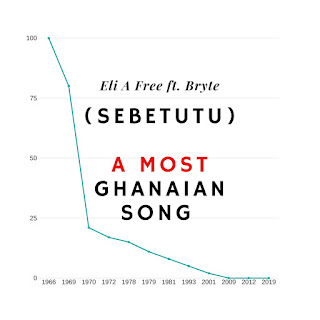SONG REVIEW: ELi A Free — Sebetutu ( A Most Ghanaian Song) Ft. Bryte
“Sebetutu (A Most Ghanaian Song)” is a sonically lush and socially conscious Afrobeat song (riddled with an undertone of Hip-life accent) inspired by the past, but crafted for the present and future Ghanaian. ELi A Free partners with Bryte, a UK-based Ghanaian artist on this project. “Sebetutu (A Most Ghanaian Song)” is mixed and mastered by the ever-talented Rvdical the Kid.
The opening is beautiful, very rich and hard-knocking. All the instruments come out to play, making the beat a winner. Is that the sound of the shekere? Lovely! The drum lines are to die for, very powerful. Those horns just killed me and I’m loving the vibe they add to the song. The electric guitars just kicked in, and I adore the chord progressions —very funky. The union between the traditional and western instruments is impeccable, creating a tapestry that gives an awesome listening pleasure. ELi enters, scatting with a local but militant edge that I love. I’m hooked now. ELi shifts into “a call and response” mood, and it makes the song very engaging. Is that the chorus? Ok! “Sebetutu” is the kind of song that will be great if performed live for an audience. “Ghana dey think of you (no sir)” ELi sings — I easily connect with this sentiment. Honestly, I think most Ghanaians will relate to the song’s message. He also sings about the power of love. Bryte is rapping now (In pidgin), and his energy is massive. Bryte’s lyrics are visceral and truthful. He slightly mocks the Ghanaian society whilst he lays down simple but powerful punchlines. Bryte’s lyrics centers on mismanagement of the country’s resources, environmental issues, corruption, begging for financial aid from the west. Lastly, he encourages the people not to depend on the government, but work to change their situations. Inspiring.
“Sebetutu (A Most Ghanaian Song)” was inspired by an article ELi A Free read on face2faceafrica.com , written by Mildred Europa Taylor. The article centers on the first native preacher of the Gold Coast who read the Bible from a mystical stone — interesting! After reading the article, I did further research to know more about this towering figure of Ghanaian history.
Born into a slave family owned by Kofi Dom, a wealthy man in Akuntanim, village near Berekum and the Ivorian border, Samson Kwame Oppong (1884 – 1960 or 1965) was a controversial Akan Christian preacher-prophet on the Gold Coast who helped embed Methodism in the Ashanti and Brong-Ahafo Regions of Ghana, in the 1920s. His missionary zeal, unconventional and fiery ministry through large-scale spiritual awakening and revival. Though his knowledge of Christian theology was minimal, he is known to have employed threats and other forceful techniques to proselytize in the Ghanaian towns and villages he worked in. Essentially, before becoming the first Gold Coast Christian prophet-preacher, Oppong, otherwise known as Sèbètutu (destroyer of native charms or personal deities) was an African traditional priest and a healer who worked from his shrine in the Ashanti territory.
After reading the article, researching and listening to the song: I noticed a compelling contrast between this afrobeat song and the article. The song and the article didn’t have an obvious connecting thread — it’s like an unusual juxtaposition of ideologies in a grand pantheon. The article centers on the life and works of a Christian preacher-prophet of the Gold Coast era, whiles ELi A Free’s song centers on . The title of the the song is snatched from Samson Kwame Oppong‘s sobriquet; Sèbètutu, which means “destroyer of native charms or personal deities.” That’s the only thing the song and the article have in common. Discovering all this, I wasn’t sated, I wanted to understand more, I wanted to know why ELi A Free was possibly inspired by the article and why the inspiration wasn’t that prominent in the song. So I started to brainstorm, because There had to be something deeper. There had to be a connection. After awhile: I got it, it finally hit me, the song finally made sense as an inspiration of the article.
My opinion: “Sebetutu (A Most Ghanaian Song)” is a metaphor, an ideology, a state of mind, or even a movement— a mental renaissance. “Sebetutu (A Most Ghanaian Song)” admonishes Ghanaians not to “destroy their native charms”: thus we shouldn’t destroy what we have/own, we should learn to value and make use of our resources so we don’t go begging the west for financial aid. The main ideology of the song is : change of mindset and attitude towards our country. And the song conveyed that beautifully and effortlessly.
CONCLUSION
The outstanding part of the song mostly come from the impeccable musical arrangements. “Sebetutu” has a stimulating horn and polyrhythmic arrangement, militant vocal delivery which beautifully punctuates the entire head bobbing instrumentation. “Sebetutu” brings out ELi A Free’s vocal delivery with a near-hysterical wail, as he drops a very memorable hook and fleeting verse. Bryte’s rap delivery isn’t that bad, it is fiery with a hip-life vibe — the lyrics are simple, powerful, visceral and truthful. Unfortunately, I couldn’t spiritually connect. I also love the consistency of the instrumentation and vocal delivery.



VERY beautiful
ReplyDelete